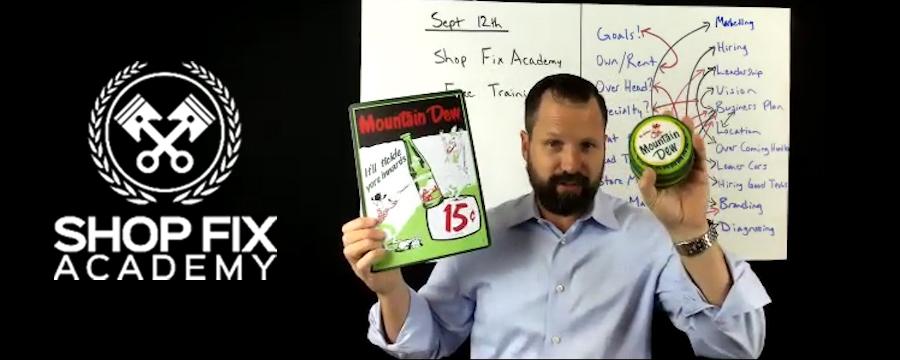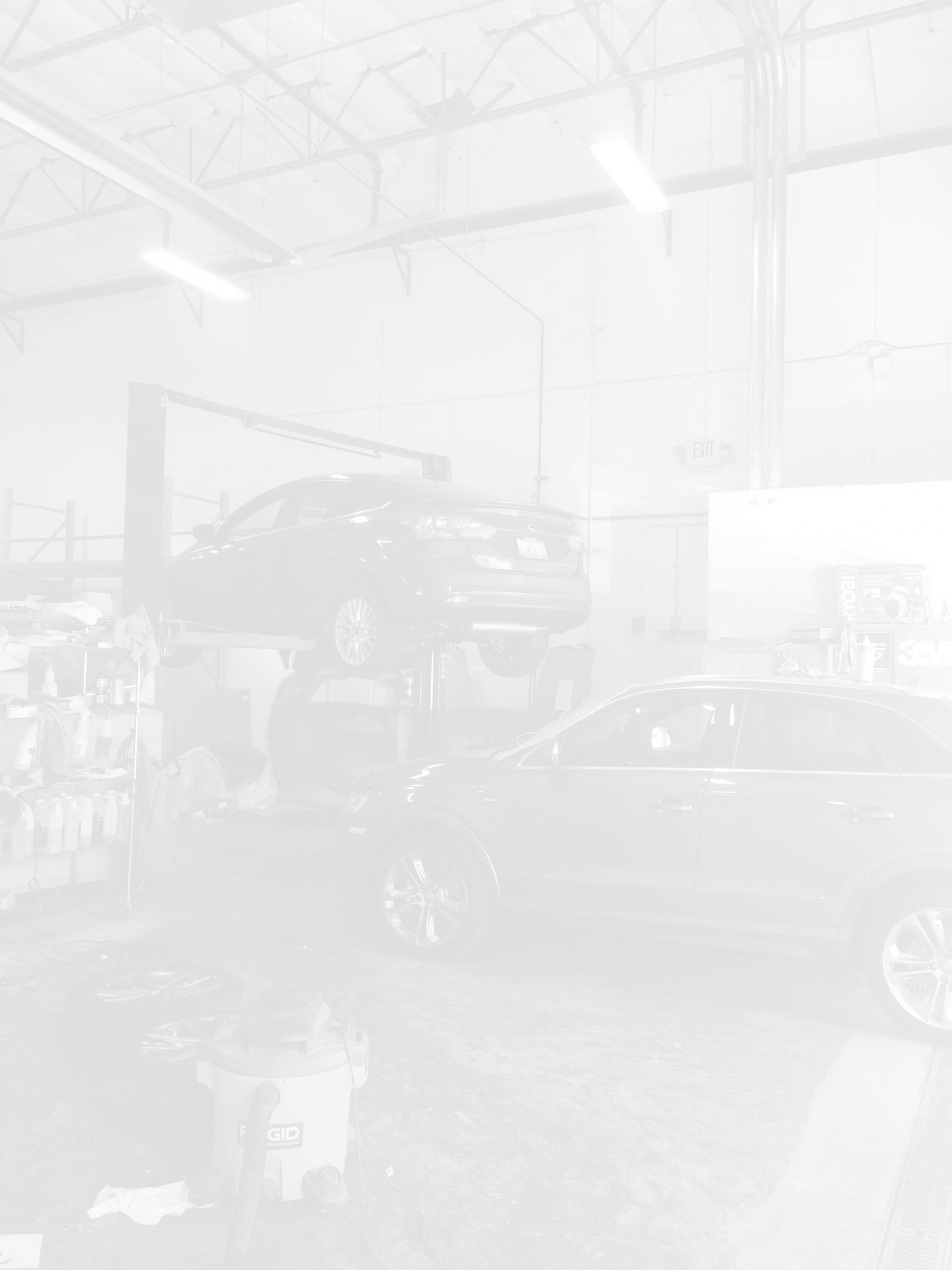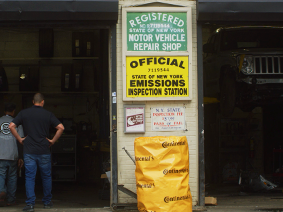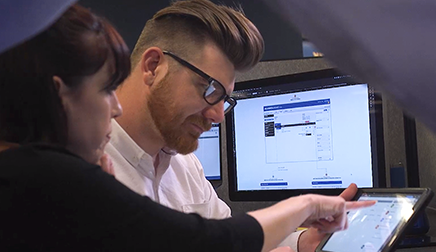
Aaron Stokes is a well-known figure in the automotive coaching industry. He started from a repair shop in a garage and over the course of 20+ years fought his way to his current status: the owner of five repair shops and founder of Shop Fix Academy. Recently, ALLDATA has worked with Aaron Stokes and Shop Fix Academy to bring shop owners useful webinars about increasing performance at their shops. The webinars can be quite lengthy – ranging from two and a half hours to almost four – so here is a summation of his first two: Win BIG in the Final Months of 2019 and Anatomy of a Record-Breaking Month.
This first webinar is more of a basic introduction of Stokes’ philosophy and get you motivated to get your shop growing. Stokes wants you to realize that you can do more than you think possible – and wants to show you how to end the year right.
As your shop is growing, you are going to hit a ceiling – a ceiling of complexity. Once you hit that ceiling your growth will start to decline. This is because you are getting beyond your oversight abilities. Imagine your shop as a popcorn bucket. At a point, the bucket becomes too full and popcorn kernels start to fall out. This represents lost potential business. The goal is to grow your bucket by adding systems to prevent this lost business. These systems will help you with your oversight abilities and allow you to keep growing and expanding.
Vision and Business Plan
This is where you should start. You can’t get your shop to move forward if you don’t know where you’re heading. Once you have your vision, make sure to share it with your staff. Everyone wants to be a part of something so make sure your techs, service writers, etc., know what your something is.
For your business plan, your location is going to make a significant impact. Take into account the number of repair shops in your area. Even if you have a lot of competition, that doesn’t mean you should be struggling to make money.
You should realize, though, you have to start spending money to make money – but money loves speed. The longer it takes for you to churn out quality repairs, the more money you’re spending per car and less money you’re making. But once you start churning out these quality repairs quickly, you’ll start making more money. Make sure to invest in the right areas; particularly staff and training. Diagnostics is the most important thing a shop has to offer so you need to invest in the proper people and information to get diagnostics right the first time.
Another business plan topic Stokes covered was the concept of loaner cars. You may be thinking of implementing loaner cars into your business plan. Stokes only recommends doing this to increase car count for specialty shops or to increase ticket prices for general repair shops. Don’t use this expecting to increase car count for general repair. You won’t attract as much extra business as you’re investing in these cars, so you’d be better off investing that extra money in more or better marketing.
Marketing (and more!)
Marketing is usually associated with three other topics: branding, promoting, and advertising; however, these topics aren’t all equal. The order of importance is as follows:
1. Marketing 2.Advertising 3.Promoting 4.Branding
But what’s the difference? Marketing is essentially pre-selling. Advertising is where you feature the benefits. Promoting is for when you’re an expert and are able to position your services via your expertise (much like Aaron Stokes promoting Shop Fix Academy with these useful webinars). Branding is showing what you stand for. Don’t focus on branding in your plan. Branding is a byproduct. If you have a quality shop, you’ll earn the reputation. But when you do get to branding, make sure to stand out. The example that Aaron Stokes uses in the webinar is creating a logo. A common logo for automotive shops to use is the outline of a car surrounding the shop name. Don’t use this. Create something simple but unique so customers can remember you.
Do you feel like there’s a curtain blocking your success? Stokes claims it’s most likely just an inner belief system holding you back. You have to break the mental barriers that are telling you that you can’t do better. You’re worth investing in yourself.
But back to marketing. You use marketing to expand your shop’s capacity, but make sure you don’t over expand and ovewhelm your shop. How? Timing is key. When you starting getting more business, it’s typical to want to hire someone new once you’re finally overwhelmed. This is your first mistake. By the time you’ll have the new guy caught up to speed, you’ll have lost enough popcorn kernels from your bucket that you’ll have lost your momentum. Hire instead right before your business starts booming. That way, by the time you get a new person acclimated, your shop would be able to handle the new capacity and you’ll start making more money.
Staff
There was significant talk about staffing during the webinar, but Stokes primarily focused on two things: pay and hiring. Stokes acknowledges that pay is hugely dependent on where you live but has broken down basic pay structures that seem to work. For Service Advisors, he talks about hourly + commission; usually $20-28/hour with a 2-5% commission. For Managers, it depends on your shop. If your shop making less than $100Ka month, he recommends a monthly salary of $4,000. If you’re making more than $100K a month, a monthly salary of $5,000 is recommended. He also adds that you should do a bonus of 5-10% of your net profits. For techs, Aaron Stokes is a huge advocate for flat rate, but if you do decide to stick with hourly, you should keep it simple. It’s okay to tier your hourly rates based on skill (i.e., an A-Tech can make $27-40/hour, a B-Tech should be around $21-26/hour, and a C-Tech at $15-20/hour), but make sure to keep the numbers clean to make it easier for everyone.
For hiring, Stokes recommends using Craigslist, but, again, timing is key: post on weekday evenings, Saturday mornings, or Sunday night. Whenever you think a potential employee would be thinking about how unhappy they are at their current job is when you should be posting your job openings.
Parts
First things first: hire a Parts Specialist. They may add another person to your payroll, but they’ll save you money on good parts. Next, make sure to get OEM parts when you can. Any reputable distributor, such as AutoZone, should carry these parts.
You also need to think about investing in the proper software. Stokes uses Lenovo ThinkPad laptops for his employees and makes sure they have access to quality OEM repair information by supplying them with ALLDATA subscriptions.
Final Thoughts
Your shop is a mirror of you. If you want to fix your shop, you have to start with yourself, and make sure you’re equipped with the right tools (both mentally and physically). Do you feel like there’s a curtain blocking your success? Stokes claims it’s most likely just an inner belief system holding you back. You have to break the mental barriers that are telling you that you can’t do better. You’re worth investing in yourself.
Big Picture:
Do you know those months where everything just seems to click? Your staff does everything they were supposed to, you hit the sweet spot with customer capacity, and end up making more money that you could have ever expected. They’re record-breaking months, and unfortunately, they don’t seem to come as often you’d want. In this webinar, Aaron Stokes explores what makes up a record-breaking month and how you can try to keep the momentum going.
The Teetering Tower
Your current system is delicate. There are so many ways things can go wrong: the advisor doesn’t care so they keep discounting tickets, a technician makes a mistake but doesn’t check, a C-Tech is doing an A-Tech’s job, there’s a customer miscommunication, etc. This is why record-breaking months aren’t common; everything has to fall in place.
So how do we keep things from falling apart?
Record Months vs. Normal Months
Let’s first do a breakdown comparison of record-breaking and normal months. For this example, let’s say you have two service advisors and three technicians: an A-Tech, a B-Tech, and a C-Tech.
| Normal | Record Breaking |
| $100K/month | $130K/month |
| 500 hours | 625 hours |
| Technicians: | Technicians: |
| A-Tech: 70 cars | A-Tech: 75 cars |
| B-Tech: 50 cars | B-Tech: 85 cars (unlocked most potential) |
| C-Tech: 30 cars | C-Tech: 35 cars |
| Service Advisors 40% close ratio | Service Advisors with increased close ratio |
| Service Advisors A sales focused | Service Advisors A selling with confidence |
| Service Advisors B dispatch focused | Service Advisors B dispatching more |
It’s important to notice first, that we’re looking at cars, not hours for technicians. This is because it’s cars, not hours that stress a technician out, so when you find a technician that’s suddenly cranking out more cars, you know it’s true untapped potential.
But how did this happen? It starts with an increased market demand. Service Advisor A hits a groove and keeps successfully selling, causing Service Advisor B to increase their dispatching. Since the A-Tech is busy with complicated work and the C-Tech just doesn’t have the same capabilities, it’s the B-Tech’s time to shine and they dramatically increase their car count.
You vs. the Market
Why did you get so many customers to begin with? Simple: the market. It’s basic economics: the market demanded more car repair and your shop supplied the services. Let’s say your capacity is normally at $100K/month and roughly 500 hours’ worth of work. Well suddenly the market is bringing pressure and your team is pushed almost to their limit. Now, you’re making $130K/month and doing 625 hours’ worth of work. But then your staff starts to break. Mistakes are being made and customers start leaving. Your mistake is thinking that that’s okay. There are no spare customers. Now, the market decides to leave and you’re back to where you were before – perhaps even slower.
This can happen during a smaller period than just a month too – like a few busy days scattered throughout the month – but the results are still the same. What you need to do is put systems in place for the busier times. When your staff gets stressed, their performance falls, and things start to snowball. Stokes recommends that in order to truly identify the places that need systems the most, you need to let these things snowball – no interference. This, no doubt, is stressful to even think about. But if you keep stopping escalations, you’ll never be able to figure out how to get your staff to stop the problems or learn how to handle things properly to avoid these issues in the first place.
The only thing that matters is net worth. At the end of the day, if you’re able to increase your net worth, you can keep moving forward and growing your business.
Technicians & Service Advisors
Aaron Stokes spent a good amount of time focusing on breaking down the importance of technician hierarchy. Most shops have three different types of techs: A-Techs, B-Techs, and C-Techs, ranked accordingly based on skill, experience, etc. But there tends to be a common mistake regarding these techs: C-Techs are diagnosing cars. Stokes emphasizes this: C-Techs shouldn’t be diagnosing cars. They simply don’t have the experience. What should happen is that the C-Techs follow A-Techs. Once the techs are properly assigned and can be given the optimal number of cars, you theoretically have the potential to reach record-breaking numbers.
Theoretically. Another problem that arises is the service advisors. A problem that Stokes talks about a lot is the advisor never telling the customer the complete RO. Once the tech starts noticing this, they will stop writing complete ROs. Once the tech starts noticing this, they will also cut corners and stop writing complete ROs. The whole problem escalates until you’re making 10% of what you should actually be making, and the quality of your shop starts to go downhill. Watch the integrity of the RO and make sure that the transition from technician to service writer is as smooth as possible.
Final Thoughts
Congratulations! You got a record-breaking month, and now you’ve learned some secrets about why it worked. You’ve unlocked your true potential, so there’s no turning back now.
Here are a few final words of advice that Stokes ended the webinar with: the only thing that matters is net worth. At the end of the day, if you’re able to increase your net worth, you can keep moving forward and growing your business. Also, your business is dependent on three factors: your techs’ ability to find work to be done, your writers’ ability to sell work, and the customers’ ability to pay for work. You hold the cards to two of these three factors. So your connection to your team is your biggest competition. Make sure you’re focusing on car count, ARO, and your profitability selling your ROs and you should be increasing those record-breaking months in the future.
If you would like to see more Aaron Stokes, you can look on our website, or visit Shop Fix Academy for more information.
Want to see how ALLDATA can improve shop efficiency? Check out our suite of products, each designed to contribute to both shop efficiency and productivity.
If you would like to read more articles like this one please subscribe to ALLDATA News.








